Rosa Luxemburg
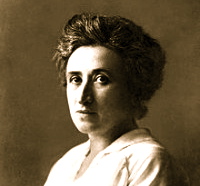
Rosa Luxemburg
A leading Marxist revolutionary, Rosa Luxemburg sought to bring Social revolution to Germany. She wrote fiercely against German imperialism and for international socialism. In 1919, she was murdered after a failed attempt to bring about a Communist revolution in Germany.
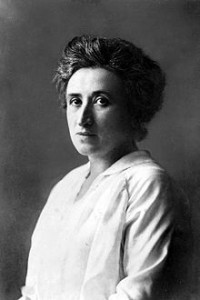 Rosa Luxemburg (also Rozalia Luxenburg; Polish: Róża Luksemburg; 5 March 1871 – 15 January 1919) was a Marxist theorist, philosopher, economist and revolutionary socialist of Polish Jewish descent who became a naturalized German citizen. She was successively a member of the Social Democracy of the Kingdom of Poland and Lithuania (SDKPiL), the Social Democratic Party of Germany (SPD), the Independent Social Democratic Party (USPD), and the Communist Party of Germany (KPD).
Rosa Luxemburg (also Rozalia Luxenburg; Polish: Róża Luksemburg; 5 March 1871 – 15 January 1919) was a Marxist theorist, philosopher, economist and revolutionary socialist of Polish Jewish descent who became a naturalized German citizen. She was successively a member of the Social Democracy of the Kingdom of Poland and Lithuania (SDKPiL), the Social Democratic Party of Germany (SPD), the Independent Social Democratic Party (USPD), and the Communist Party of Germany (KPD).
In 1915, after the SPD supported German involvement in World War I, she and Karl Liebknecht co-founded the anti-war Spartakusbund (“Spartacus League”) which eventually became the Communist Party of Germany (KPD). During the German Revolution she founded the Die Rote Fahne (“The Red Flag”), the central organ of the Spartacist movement.
She considered the 1919 Spartacist uprising a blunder, but supported it after Liebknecht ordered it without her knowledge. When the revolt was crushed by the social democratic government and the Freikorps (World War I veterans who banded together into right-wing paramilitary groups), Luxemburg, Liebknecht and some of their supporters were captured and murdered. Luxemburg was shot and her body thrown in the Landwehr Canal in Berlin.
Due to her pointed criticism of both the Marxist-Leninist and more moderate social democrat schools of socialism, Luxemburg has had a somewhat ambivalent reception among scholars and theorists of the political left. Nonetheless, some Marxists came to regard Luxemburg and Liebknecht as martyrs: according to the Federal Office for the Protection of the Constitution, commemoration of Rosa Luxemburg and Karl Liebknecht continues to play an important role among the German political left.
Life – Poland
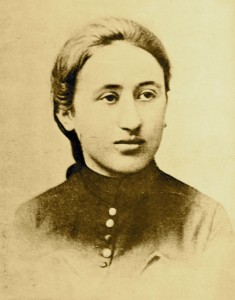 Luxemburg was born to a Jewish family in Zamość on 5 March 1871, in Russian-controlled Congress Poland. She was the fifth child of timber trader Eliasz Luxemburg and Line Löwenstein. The family moved to Warsaw in 1873. After being bedridden with a hip ailment at the age of five, she was left with a permanent limp.
Luxemburg was born to a Jewish family in Zamość on 5 March 1871, in Russian-controlled Congress Poland. She was the fifth child of timber trader Eliasz Luxemburg and Line Löwenstein. The family moved to Warsaw in 1873. After being bedridden with a hip ailment at the age of five, she was left with a permanent limp.
Starting in 1880, Luxemburg attended a Gymnasium. From 1886, she belonged to the Polish, left-wing Proletariat party (founded in 1882, anticipating the Russian parties by 20 years). She began in politics by organizing a general strike; as a result, four of the party’s leaders were put to death and the party was disbanded, though remaining members, including Luxemburg, met in secret. In 1887, she passed her Matura examinations. After fleeing to Switzerland to escape detention in 1889, she attended Zürich University (as did the socialists Anatoli Lunacharsky and Leo Jogiches), studying philosophy, history, politics, economics, and mathematics. She specialized in Staatswissenschaft (the science of forms of state), the Middle Ages, and economic and stock exchange crises.
Her doctoral dissertation, The Industrial Development of Poland, was officially presented in spring 1897 to the University of Zurich, which awarded her a Doctor of Law degree. Her dissertation under the title Die Industrielle Entwicklung Polens was published by Duncker and Humblot in Leipzig in 1898.
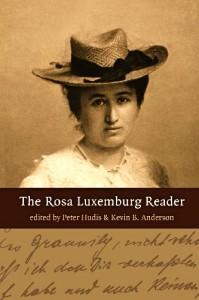 In 1893, with Leo Jogiches and Julian Marchlewski (alias Julius Karski), Luxemburg founded the newspaper Sprawa Robotnicza (“The Workers’ Cause”), to oppose the nationalist policies of the Polish Socialist Party, believing that only through socialist revolution in Germany, Austria, and Russia could an independent Poland exist. She maintained that the struggle should be against capitalism, not just for an independent Poland. Her position of denying a national right of self-determination under socialism provoked philosophic tension with Vladimir Lenin. She and Leo Jogiches co-founded the Social Democratic Party of the Kingdom of Poland (Social Democracy of the Kingdom of Poland and Lithuania, SDKPiL, after merging with Lithuania’s social democratic organization). Despite living in Germany for most of her adult life, Luxemburg was the principal theoretician of the Polish Social Democrats, and led the party in a partnership with Jogiches, its principal organizer.
In 1893, with Leo Jogiches and Julian Marchlewski (alias Julius Karski), Luxemburg founded the newspaper Sprawa Robotnicza (“The Workers’ Cause”), to oppose the nationalist policies of the Polish Socialist Party, believing that only through socialist revolution in Germany, Austria, and Russia could an independent Poland exist. She maintained that the struggle should be against capitalism, not just for an independent Poland. Her position of denying a national right of self-determination under socialism provoked philosophic tension with Vladimir Lenin. She and Leo Jogiches co-founded the Social Democratic Party of the Kingdom of Poland (Social Democracy of the Kingdom of Poland and Lithuania, SDKPiL, after merging with Lithuania’s social democratic organization). Despite living in Germany for most of her adult life, Luxemburg was the principal theoretician of the Polish Social Democrats, and led the party in a partnership with Jogiches, its principal organizer.
Germany
The recently published Letters of Rosa Luxemburg shed important light on Rosa Luxemburg’s life in Germany. As Irene Gammel writes in a review of the English translation of the book in the Globe and Mail: “The three decades covered by the 230 letters in this collection provide the context for her major contributions as a political activist, feminist and writer. In her controversial time of 1913, The Accumulation of Capital, as well as through her work as a co-founder of the radical Spartacus League, Luxemburg helped to shape Germany’s young democracy by advancing an international, rather than a nationalist, outlook. This farsightedness partly explains her remarkable popularity as a socialist icon and its continued resonance in movies, novels and memorials dedicated to her life and oeuvre.” Gammel also notes that for Rosa, “the revolution was a way of life,” and yet that the letters also challenge the stereotype of “Red Rosa” as a ruthless fighter.
Before World War I
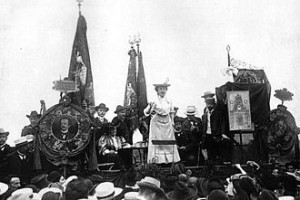 Luxemburg speaking to a crowd in 1907.
Luxemburg speaking to a crowd in 1907.
In May 1898 Luxemburg married Gustav Lübeck, obtained German citizenship, and moved to Berlin. There, she was active in the left wing of the Social Democratic Party of Germany (SPD), in which she sharply defined the border between her faction and the Revisionism Theory of Eduard Bernstein by attacking him in her brochure, released in September 1898, titled Social Reform or Revolution. Luxemburg’s rhetorical skill made her a leading spokeswoman in denouncing the SPD’s reformist parliamentary course. She argued that the critical difference between capital and labour could only be countered if the proletariat assumed power and effected revolutionary changes in production methods. She wanted the Revisionists ousted from the SPD. That did not occur, but Karl Kautsky’s leadership retained a Marxist influence on its programme.
From 1900, Luxemburg published analyses of contemporary European socio-economic problems in newspapers. Foreseeing war, she vigorously attacked what she saw as German militarism and imperialism. She wanted a general strike to rouse the workers to solidarity and prevent the coming war; the SPD leaders refused, and she broke with Karl Kautsky in 1910. Between 1904 and 1906, she was imprisoned for her political activities on three occasions. In 1907, she went to the Russian Social Democrats’ Fifth Party Day in London, where she met Vladimir Lenin. At the Second International (Socialist) Congress, in Stuttgart, she moved a resolution, which was accepted, that all European workers’ parties should unite in attempting to stop the war.
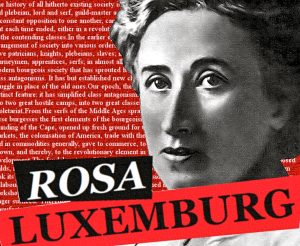 Luxemburg taught Marxism and economics at the SPD’s Berlin training centre. A student of hers, Friedrich Ebert later became SPD leader, and later the Weimar Republic’s first president. In 1912 she was the SPD representative at the European Socialists congresses. With French socialist Jean Jaurès, she argued that European workers’ parties should organize a general strike when war broke out. In 1913, she told a large meeting: “If they think we are going to lift the weapons of murder against our French and other brethren, then we shall shout: ‘We will not do it!'” But in 1914, when nationalist crises in the Balkans erupted to violence and then war, there was no general strike and the SPD majority supported the war – as did the French Socialists. The Reichstag unanimously agreed to financing the war. The SPD voted in favour of that and agreed to a truce (Burgfrieden) with the Imperial government, promising to refrain from any strikes during the war. This led Luxemburg to contemplate suicide: The “revisionism” she had fought since 1899 had triumphed.
Luxemburg taught Marxism and economics at the SPD’s Berlin training centre. A student of hers, Friedrich Ebert later became SPD leader, and later the Weimar Republic’s first president. In 1912 she was the SPD representative at the European Socialists congresses. With French socialist Jean Jaurès, she argued that European workers’ parties should organize a general strike when war broke out. In 1913, she told a large meeting: “If they think we are going to lift the weapons of murder against our French and other brethren, then we shall shout: ‘We will not do it!'” But in 1914, when nationalist crises in the Balkans erupted to violence and then war, there was no general strike and the SPD majority supported the war – as did the French Socialists. The Reichstag unanimously agreed to financing the war. The SPD voted in favour of that and agreed to a truce (Burgfrieden) with the Imperial government, promising to refrain from any strikes during the war. This led Luxemburg to contemplate suicide: The “revisionism” she had fought since 1899 had triumphed.
In response, Luxemburg organised anti-war demonstrations in Frankfurt, calling for conscientious objection to military conscription and the refusal to obey orders. On that account, she was imprisoned for a year for “inciting to disobedience against the authorities’ law and order.”

